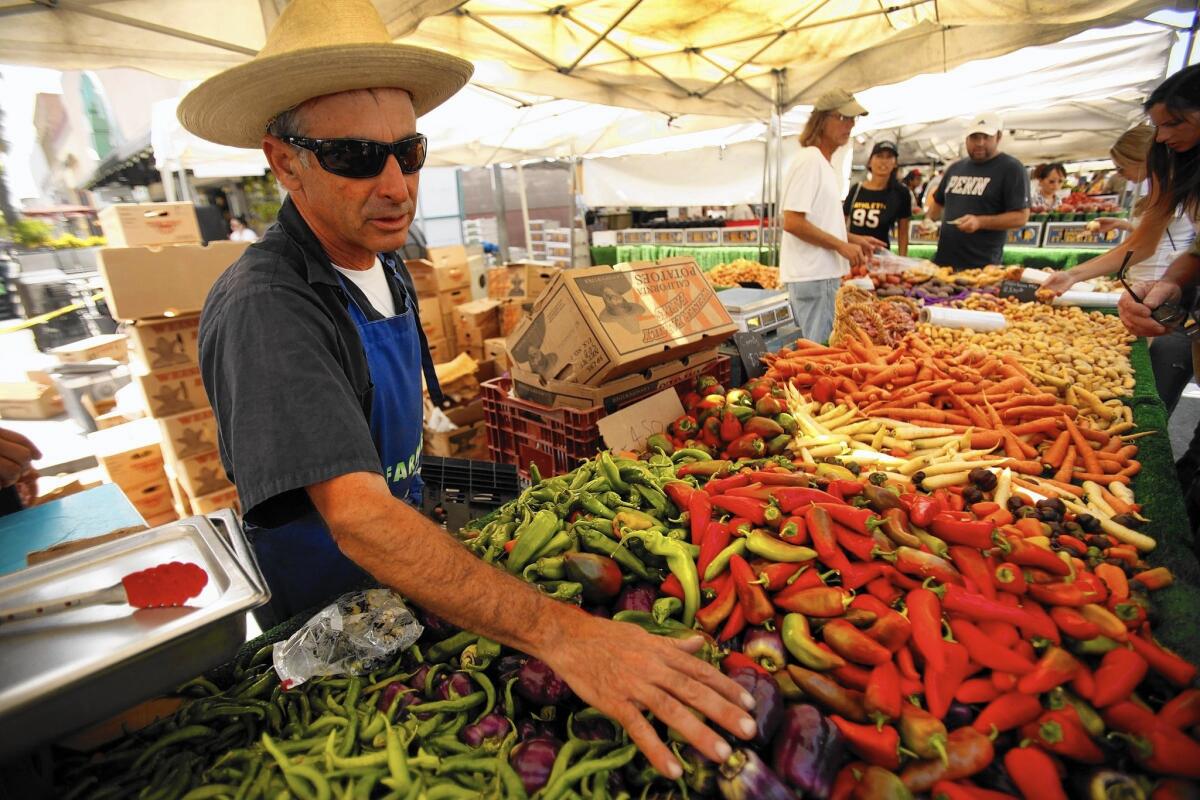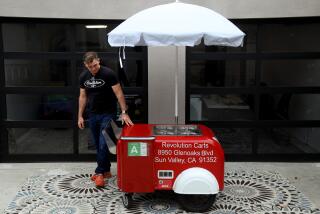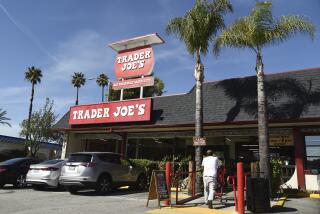Amazon begins delivering farmers market goods to Southland customers

A new service from online retail powerhouse Amazon.com will deliver herbs from Maggie’s Farm, Mangalitsa pork from Peads & Barnetts and black cod from Wild Local Seafood — direct to your doorstep with just a mouse click.
Amazon has rolled out its new Farmers Market Direct program in Southern California, in partnership with Fresh Nation, a start-up in Stamford, Conn., that launched in 2013.
Fresh Nation has begun delivering farmers market products through Amazon in Los Angeles, Orange and San Diego counties. Amazon is trying the service first in the Southland and will expand to New York City in a few weeks before deciding whether to roll it out elsewhere.
It’s just the latest stab at food delivery, which has attracted a crop of start-ups that cut out the middleman by ferrying produce from local farms and artisan producers directly to homes. Each company is tackling the tricky problem of delivering perishable foods, which has long bedeviled efforts to deliver groceries and meals to customers too busy to shop for themselves.
“It’s what separates the food industry from the fashion industry,” said Brita Rosenheim of consulting firm Rosenheim Advisors — that is, it’s much easier to deliver shoes than salads.
“Food is different — it requires more padding, requires temperature sensitivity, particularly raw food and raw protein,” she said. “It’s a big obstacle and a big cost for the premium you are paying for delivery.”
Development of food-delivery technology has attracted an enormous amount of money. About $710 million was invested in the segment in the first half of 2015, more than the $681 million invested all of last year, according to data from Rosenheim Advisors.
Fresh Nation is the brainchild of Tony Lee, who took a break from a career in e-commerce to manage a farmers market in his hometown of Danbury, Conn., and then fell in love with the business.
Lee said he spent about a year creating a huge database of farmers markets and vendors across the country, which provided the backbone to the start-up’s supply chain. The company ran tests in Southern California and on the East Coast, and when it had the bugs worked out went to Amazon, which already has a grocery delivery service up and running in Amazon Fresh.
Farmers markets “provide a very efficient distribution center for fresh local food in all the main urban areas,” Lee said. “That’s the problem we were trying to solve: How do you get fresh local food every day that’s as easy as buying supermarket food?”
Partnering with Amazon gives the company access to a broad swath of new customers, Lee said, along with the online retailer’s skill at swift delivery.
“Our mission is to bring fresh local food to millions of people,” he said. “The only way you can do that is partner with a company like Amazon that has millions of customers.”
Fresh Nation’s database gives its personal food shoppers detailed information about farmers markets and the vendors that peddle goods at each one.
Before its shoppers head out, Fresh Nation places orders with farmers based on orders received and an estimate of demand for individual items. Its shoppers pick up that food and package it into individual totes at each market; those bags are then driven via refrigerated trucks to the Amazon distribution center in San Bernardino.
From there, Amazon trucks begin to deliver those bags to customers, often in the morning. Fresh Nation promises that the food will arrive at customers’ doorsteps within 36 hours of harvest.
To order, customers must have an Amazon Prime Fresh membership, which costs $299 a year. That covers all the benefits of being a Prime member — such as free two-day delivery and access to streaming entertainment content — but also includes free same-day and next-day early-morning delivery on orders over $50 of fresh groceries and everyday essentials such as shampoo.
Fresh Nation offers baskets and individual items. The baskets contain an assortment of fruit, vegetables or both. They are available in large ($59) and small ($39) sizes.
The individual offerings vary widely, and in most cases prices are only a little higher than they would be at the market. Almonds from Fat Uncle Farms are $6.85 for a 4-ounce bag. Blackberries from Pudwill Berry Farm are $5.60 per 6-ounce basket. Locally caught swordfish from Wild Local Seafood is $28 a pound.
Alex Weiser of Weiser Family Farms, which grows fruits and vegetables on three farms in Kern and San Bernardino counties, said his family is in the initial stages of working with Fresh Nation.
“It could be great for both customers and farmers if it works,” he said. “But it certainly won’t change what we do at all. We’ll still be picking everything fresh and taking it to the markets.”
Other start-ups that are aiming to bypass the farmers market are trying different ways of keeping produce fresh as it travels from farms to fridges.
Terra’s Kitchen, which launched on the West Coast this summer, sells pre-measured ingredients for particular recipes that simply have to be tossed in a pan to cook. The food is sourced directly from farms and vendors, and then sliced and diced at a Sacramento facility.
The key selling point is that already prepped food is mailed to customers in a device called “the vessel” — a reusable plastic box roughly the size of a microwave with walls lined with reusable ice packs. Each box’s contents — tucked into drawers inside — are kept at 32 to 41 degrees during the entire process before arriving at a doorstep, said Michael McDevitt, chief executive of Terra’s.
The vessel allows Terra’s Kitchen to ship via FedEx and is designed to be used over and over again. Customers can set the vessel back on the doorstep after peeling off the original label to find the return label underneath.
“We are able to ship that last mile with a very eco-friendly cooler, in a sense, that allows produce to stay fresh,” McDevitt said.
Tricky logistics have held back or crippled companies that otherwise have been crowd pleasers.
Good Eggs, the San Francisco start-up that delivers organic produce and gourmet fare, closed its Los Angeles, New Orleans and Brooklyn, N.Y., operations last month. It also said it planned to scale back its hometown operations.
Rob Spiro, Good Eggs’ chief executive, said the company didn’t “fully understand” that it needed a different approach to logistics and supply chains, or “all of the pieces of getting food from local producers to the kitchens of our customers.”
“The single biggest mistake we made was growing too quickly, to multiple cities, before fully figuring out the challenges of building an entirely new supply chain,” he wrote in a blog post. “It was, and is, complicated, way more complicated than we ever anticipated.”
But Good Eggs’ failure doesn’t bother Lee of Fresh Nation.
“I think it is more a question of … what model may be more sustainable in the long run,” he said.
Twitter: @ByShanLi
Twitter: @russ_parsons1
More to Read
Inside the business of entertainment
The Wide Shot brings you news, analysis and insights on everything from streaming wars to production — and what it all means for the future.
You may occasionally receive promotional content from the Los Angeles Times.












